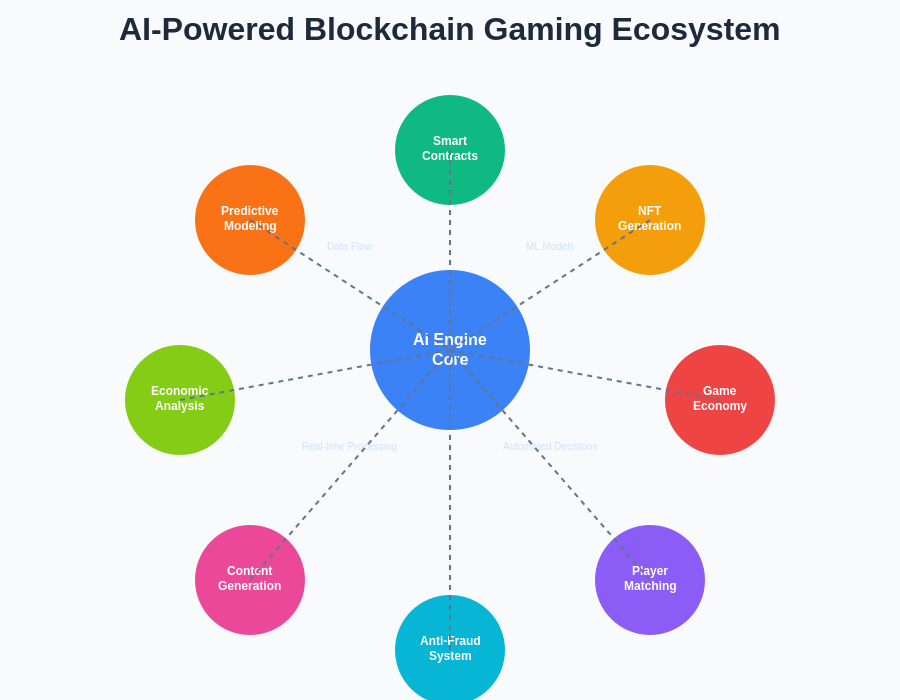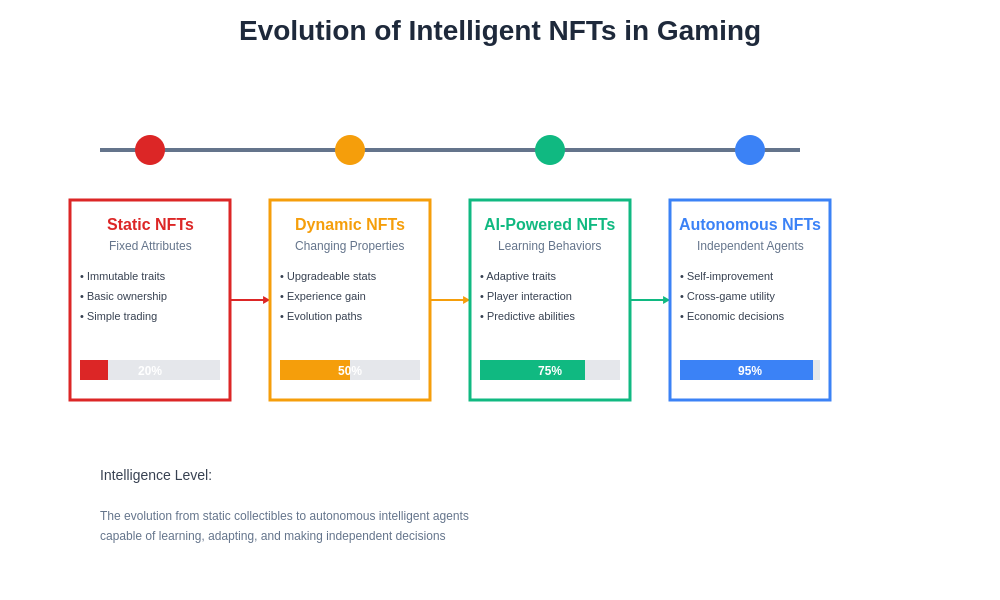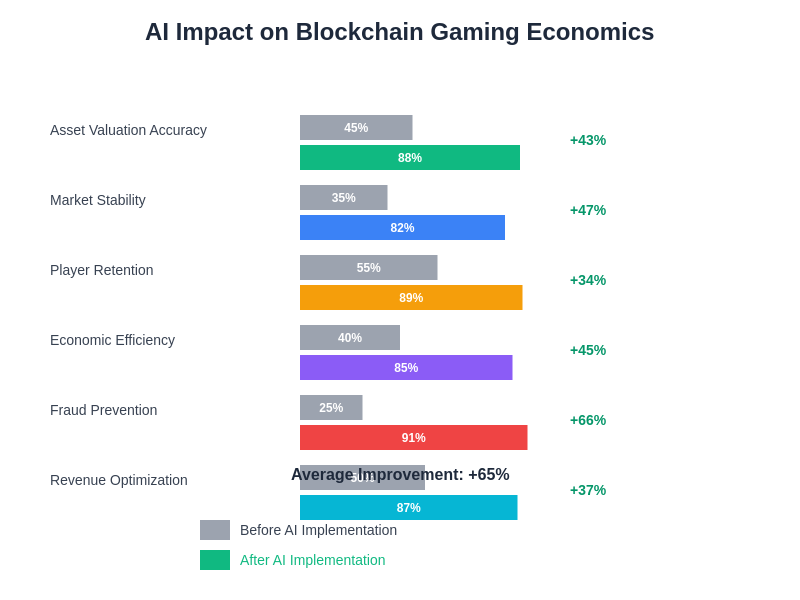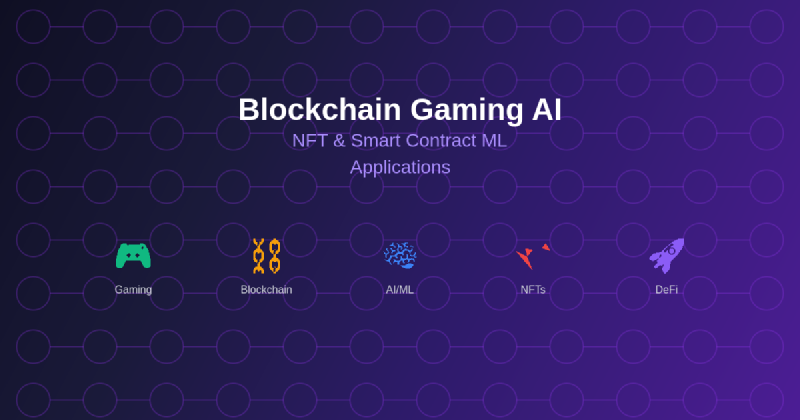The convergence of artificial intelligence, blockchain technology, and gaming has created an unprecedented paradigm shift in the digital entertainment landscape, fundamentally transforming how games are developed, played, and monetized. This revolutionary intersection has given birth to intelligent gaming ecosystems where machine learning algorithms power dynamic NFTs, optimize smart contract interactions, and create autonomous economic systems that evolve based on player behavior and market conditions. The integration of AI into blockchain gaming represents more than technological innovation; it embodies a complete reimagining of interactive entertainment where virtual assets possess genuine intelligence and gaming economies operate with sophisticated autonomy.
Stay updated with the latest AI gaming trends to discover cutting-edge developments in blockchain gaming and emerging AI applications that are shaping the future of interactive entertainment. The fusion of these transformative technologies is creating new possibilities for player engagement, asset ownership, and economic participation that were previously unimaginable in traditional gaming environments.
The Evolution of Intelligent Gaming Assets
The traditional concept of static digital assets has been completely revolutionized through the implementation of AI-powered NFTs that demonstrate adaptive behavior and evolving characteristics. These intelligent non-fungible tokens represent a fundamental departure from conventional digital collectibles by incorporating machine learning algorithms that enable them to learn from player interactions, market conditions, and environmental factors within their respective gaming ecosystems. The result is a new category of digital assets that possess memory, personality, and the ability to develop unique traits based on their experiences and interactions.
Machine learning models embedded within NFT metadata enable these digital assets to analyze player behavior patterns, adapt their characteristics accordingly, and even influence gameplay mechanics in real-time. This dynamic evolution creates unprecedented value propositions for players, as their digital assets become increasingly unique and valuable through active engagement rather than remaining static collectibles with fixed attributes. The implementation of neural networks within NFT smart contracts allows for complex decision-making processes that can affect everything from visual appearance to functional capabilities within gaming environments.

The comprehensive ecosystem demonstrates how artificial intelligence serves as the central orchestrating force that connects and optimizes all aspects of blockchain gaming, from smart contract automation to player experience personalization. This interconnected network of AI-driven systems creates emergent behaviors and opportunities that transcend the capabilities of any individual component.
Smart Contract Intelligence and Automation
The integration of artificial intelligence into smart contract architecture has introduced unprecedented levels of automation and sophistication to blockchain gaming ecosystems. Traditional smart contracts operate according to predetermined conditional logic, but AI-enhanced smart contracts can analyze complex data patterns, make predictive decisions, and adapt their behavior based on changing circumstances within the gaming environment. This intelligence enables the creation of self-governing game economies that can automatically adjust reward systems, balance in-game currencies, and optimize player experiences without requiring manual intervention from developers.
Machine learning algorithms embedded within smart contracts can monitor player behavior, identify emerging trends, and proactively adjust game parameters to maintain optimal engagement levels and economic stability. These intelligent contracts can analyze vast amounts of gameplay data to predict market movements, detect fraudulent activities, and implement dynamic pricing mechanisms that respond to supply and demand fluctuations in real-time. The result is gaming ecosystems that operate with unprecedented autonomy while maintaining fairness and economic sustainability.
Discover advanced AI capabilities with Claude to explore how sophisticated reasoning and analysis can enhance blockchain gaming development and create more intelligent gaming ecosystems. The combination of advanced AI reasoning with blockchain technology opens new frontiers for creating truly autonomous and intelligent gaming experiences.
Dynamic Game Economy Optimization
The implementation of machine learning in blockchain gaming has revolutionized economic modeling and resource management within virtual worlds. AI-powered systems can analyze complex economic interactions between players, predict market trends, and automatically implement balancing mechanisms that prevent inflation, deflation, and other economic instabilities that have historically plagued virtual economies. These intelligent systems continuously monitor thousands of economic variables simultaneously, enabling them to maintain optimal economic conditions that promote healthy player engagement and sustainable growth.
Advanced algorithms analyze player spending patterns, resource accumulation rates, and market participation levels to create dynamic pricing models that adapt to changing player demographics and economic conditions. This sophisticated economic modeling ensures that new players can enter the ecosystem without being disadvantaged by established players while maintaining incentives for long-term engagement and investment. The integration of predictive analytics enables these systems to anticipate economic disruptions and implement preemptive measures that maintain stability and fairness across diverse player populations.
Procedural Content Generation and AI Creativity
Artificial intelligence has transformed content creation in blockchain gaming through sophisticated procedural generation systems that create unique, valuable, and engaging game content automatically. Machine learning algorithms can generate complex game worlds, character designs, storylines, and gameplay mechanics that adapt to player preferences and behavior patterns. This AI-driven creativity ensures that each player experiences truly unique content while maintaining the scarcity and value propositions essential to blockchain-based gaming economies.
Neural networks trained on vast datasets of successful game content can produce innovative combinations of gameplay elements, visual designs, and narrative structures that would be impossible to create through traditional development methods. These AI systems can analyze player engagement data to identify which types of content generate the most positive responses and automatically generate similar content that maintains novelty while building upon proven engagement patterns. The result is gaming experiences that feel both familiar and surprising, combining the best aspects of human creativity with the analytical power of artificial intelligence.

The evolutionary progression from static NFTs to autonomous intelligent agents represents a fundamental transformation in digital asset capabilities. Each stage introduces increasingly sophisticated AI features that enable greater player engagement, enhanced utility, and autonomous decision-making capabilities that blur the lines between virtual objects and intelligent entities.
Intelligent Player Matching and Personalization
The application of machine learning to player matching and personalization has created more engaging and balanced gaming experiences in blockchain gaming environments. AI algorithms can analyze player skill levels, playing styles, preferences, and behavioral patterns to create optimal matchmaking scenarios that enhance enjoyment for all participants while maintaining competitive balance. These intelligent systems go beyond simple skill-based matching to consider psychological factors, social preferences, and long-term engagement patterns that contribute to positive gaming experiences.
Personalization algorithms can dynamically adjust game difficulty, content presentation, and reward structures to match individual player preferences and skill development trajectories. This sophisticated personalization ensures that players remain challenged without becoming frustrated, while providing appropriate rewards that motivate continued engagement without creating unsustainable economic pressures. The integration of behavioral analysis enables these systems to identify player types and adapt their approach accordingly, creating customized experiences that feel tailored to individual preferences and playing styles.
Anti-Fraud and Security Enhancement
Blockchain gaming platforms have implemented sophisticated AI-powered security systems that can detect and prevent various forms of fraud, cheating, and malicious behavior in real-time. Machine learning algorithms analyze player behavior patterns, transaction histories, and gameplay metrics to identify anomalies that may indicate fraudulent activities, bot usage, or other forms of exploitation. These intelligent security systems can adapt to new attack vectors and evolving fraud techniques, maintaining the integrity of gaming ecosystems without requiring constant manual updates.
Advanced pattern recognition systems can identify coordinated attacks, market manipulation attempts, and other sophisticated fraud schemes that would be impossible to detect through traditional security measures. These AI-powered security systems operate continuously in the background, analyzing millions of data points to maintain fair playing conditions and protect legitimate players from malicious actors. The implementation of behavioral biometrics and advanced authentication mechanisms ensures that player accounts remain secure while maintaining seamless user experiences.
Enhance your research capabilities with Perplexity to access comprehensive information about blockchain gaming security, AI implementation strategies, and emerging trends in intelligent gaming systems. The combination of advanced research tools with practical implementation knowledge accelerates the development of secure and intelligent gaming platforms.
Predictive Analytics for Game Development
The integration of predictive analytics into blockchain gaming development has revolutionized how games are designed, balanced, and updated over time. Machine learning models can analyze vast amounts of player data to predict which features will be most successful, identify potential balance issues before they become problematic, and forecast long-term player engagement trends. This predictive capability enables developers to make data-driven decisions that improve game quality while reducing development costs and time-to-market.
Advanced analytics systems can simulate thousands of different game scenarios to identify optimal parameter settings, predict the impact of proposed changes, and test new features before implementation. These sophisticated modeling capabilities enable developers to experiment with complex game mechanics and economic systems in virtual environments before deploying them to live gaming platforms. The result is more polished, balanced, and engaging gaming experiences that have been thoroughly tested and optimized before reaching players.
Cross-Platform AI Integration
The development of cross-platform AI integration has enabled blockchain gaming assets and experiences to transcend individual game boundaries, creating interconnected gaming ecosystems where intelligent assets can move between different games and platforms while retaining their learned behaviors and accumulated value. This interoperability represents a fundamental shift toward truly persistent virtual identities and assets that exist independently of any single gaming platform or environment.
Machine learning algorithms enable these cross-platform assets to adapt their characteristics and abilities to different gaming contexts while maintaining their core identity and accumulated experiences. This adaptability creates new possibilities for asset utility and value creation, as intelligent NFTs can provide benefits across multiple games and platforms simultaneously. The implementation of standardized AI protocols and data formats ensures compatibility between different gaming platforms while maintaining the unique characteristics that make each asset valuable and distinct.
Autonomous Tournament and Competition Management
Artificial intelligence has enabled the creation of fully autonomous tournament and competition management systems that can organize, manage, and execute complex gaming competitions without human intervention. These intelligent systems can analyze player skill levels, create balanced tournament brackets, manage prize distributions, and even provide real-time commentary and analysis of competitive gameplay. The automation of tournament management has made competitive gaming more accessible while reducing the costs and complexity associated with organizing large-scale gaming events.
Machine learning algorithms can optimize tournament formats, predict viewer engagement levels, and automatically adjust competition parameters to maximize entertainment value and competitive balance. These systems can analyze historical performance data, current form, and other relevant factors to create the most exciting and fair competitive matchups possible. The integration of natural language processing enables these systems to generate engaging commentary and analysis that enhances the spectator experience while providing valuable insights for participants and viewers.
Virtual World Physics and Environmental AI
The implementation of AI-driven physics and environmental systems has created more realistic and responsive virtual worlds that adapt to player actions and changing conditions in real-time. Machine learning algorithms can simulate complex environmental interactions, weather patterns, and ecosystem dynamics that create immersive and believable virtual worlds. These intelligent environmental systems can learn from player interactions and adapt their behavior to create more engaging and realistic gaming experiences.
Advanced simulation systems can model complex ecological relationships, economic systems, and social dynamics that create emergent gameplay opportunities and unexpected interactions. These AI-driven environmental systems can generate unique events, adapt to changing player populations, and create dynamic storytelling opportunities that emerge organically from the interaction between intelligent systems and player actions. The result is virtual worlds that feel alive and responsive, providing endless opportunities for exploration and discovery.
Decentralized Autonomous Gaming Organizations
The evolution of decentralized autonomous organizations specifically designed for gaming has created new models for community governance and game development that leverage artificial intelligence for decision-making and resource allocation. These intelligent DAOs can analyze community sentiment, evaluate development proposals, and automatically implement governance decisions based on predefined criteria and machine learning algorithms. The integration of AI into DAO governance creates more efficient and responsive decision-making processes while maintaining democratic participation and transparency.
Machine learning systems can analyze voting patterns, community engagement metrics, and project outcomes to optimize governance processes and improve decision-making quality over time. These intelligent governance systems can identify potential conflicts of interest, detect manipulation attempts, and ensure that community decisions reflect the genuine preferences of legitimate stakeholders. The result is more effective and equitable governance systems that can manage complex gaming ecosystems while maintaining community trust and participation.
Future Implications and Technological Convergence
The continued evolution of AI-powered blockchain gaming represents the beginning of a broader transformation in how digital entertainment, virtual economies, and social interactions are structured and managed. As artificial intelligence capabilities continue to advance, we can expect even more sophisticated integration between machine learning systems, blockchain technology, and gaming platforms that will create entirely new categories of interactive entertainment and economic participation.
The convergence of quantum computing, advanced AI, and blockchain technology promises to unlock unprecedented computational capabilities that will enable the creation of truly intelligent virtual worlds with complex autonomous systems that can support massive player populations while maintaining optimal performance and engagement. These technological advances will likely lead to the emergence of persistent virtual universes that operate independently while providing meaningful economic opportunities and social experiences for participants worldwide.
The development of more sophisticated AI systems will enable the creation of virtual beings with genuine intelligence and personality that can serve as companions, advisors, and collaborators within gaming environments. These intelligent entities will be able to form meaningful relationships with players, learn from their interactions, and contribute to the creation of richer and more engaging virtual experiences that blur the lines between artificial and authentic social interactions.

The quantitative impact of artificial intelligence on blockchain gaming economics demonstrates substantial improvements across all key performance indicators. These measurable benefits validate the transformative potential of AI integration and highlight the economic advantages that intelligent gaming systems provide to developers, players, and the broader gaming ecosystem.
Disclaimer
This article is for informational purposes only and does not constitute professional advice regarding blockchain gaming investments, AI technology implementation, or smart contract development. The views expressed are based on current understanding of emerging technologies and their potential applications in gaming environments. Readers should conduct thorough research and consult with qualified professionals before making investment decisions or implementing blockchain gaming solutions. The rapidly evolving nature of AI and blockchain technology means that specific technical implementations and market conditions may change significantly over time. Individual results and experiences may vary based on technical expertise, market conditions, and regulatory environments.
